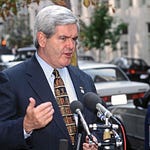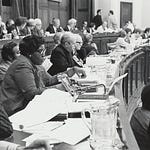Amazon is a top recruiter of retired workers who need extra income to survive. Photo credit: Tada Images/Shutterstock.com
We are all thinking about the aging process this week. Unless the standard bearers of our two major political parties change, as a nation we may be doomed to talk about aging—and who is too old to work-- for the next five months. If—heaven forfend—Republican Donald J. Trump wins the November election, he would be 78 upon taking the oath of office. Democratic incumbent Joseph R. Biden, currently 81, would be 82 if he were to be sworn in for a second term.
The first presidential debate struck terror into Democratic hearts. Biden seemed fatigued, hoarse, and early in the debate, incoherent at times. Donald Trump, who is always incoherent, vigorously spewed lie after lie. But since he left the presidency in a cloud of tear gas and violence in January 2021, Trump’s appearances have also been marked by what appear to be neurological issues: memory lapses, physical hesitation, what some have identified as a tremor, and nodding off to sleep during his recent Manhattan trial.
South Carolina Governor and 2024 Republican primary candidate Nikki Haley sounded the alarm about both candidates on Bloomberg TV shortly before she dropped out of contention. This year’s presidential race, in addition to sparking a debate about bringing back mandatory retirement, something that has been illegal in all but a few industries since 1986, has also unleashed ugly, unexamined ageism. But here’s the paradox. As a society, we also celebrate elderly Americans when they have qualities that we associate with aging well: in other words, when they are spry and not disabled; witty and not showing signs of verbal and intellectual decline.
And above all we love it when they are productive. As one example, in 2022 an ABC News reporter in 2022 celebrated the world’s oldest working flight attendant, American Airlines’ Bette Nash earns praise for her love of flight, her devotion to service, her bright spirits, and what is clearly excellent physical fitness at 86. What we never learn, however, is whether Nash wanted to keep working until her death from breast cancer this year. Was she saddled with debt from caring for a disabled child, or paying her own medical bills? Or was she—like 80% of Americans—not paid enough to be able to save for a retirement? In 1989, when Nash’s career was about half over, the average salary for a college-educated flight attendant was between $20,000 to $30,000 a year.
In fact, as economist Teresa Ghilarducci explains in her new book, Work, Retire, Repeat: The Uncertainty of Retirement in the New Economy (University of Chicago Press, 2024), the hidden story behind feel-good news features is that the vast majority of Americans of retirement age can’t afford to stop working. And that retirement isn’t always voluntary. Over half of United States workers are pushed out, fired, and laid off as young as 62. Many lose higher salary jobs in their fifties. Many have no savings, not because they are undisciplined, but because they were never paid enough to live or had to raid 401(k) accounts to address family catastrophes. We can expect that for several generations of educated workers, money that could have gone to retirement has instead gone to banks profiting from student loan repayment.
Fact: only 20% of us can afford to retire at an age when we can expect a decade or more of good health to enjoy the fruits of our labors.
As Ghilarducci explains in this episode, most Americans don’t retire, they just get older and more disabled, many working at minimum, or sub-minimum, wage jobs. A staggering 78% of the home health care workforce, mostly women of color, are over 40. Older Americans waitress, clean houses, and baby sit. They work at big box stores, like Walmart and Target, at Amazon warehouses, fast-food franchises, and grocery stores. At my local Stop and Shop, mostly self-checkout, every time the machine makes an error, a woman in her seventies who stands eight hours a day rushes over to reset it. “As long as she screws up”—she being the machine—“I’ll have a job!” this woman says to me every time.
It's not that our debates about an aging political class aren’t relevant: they are. The average age of our presidential candidates is 79.5 years, Senators 64.3 years, and members of Congress 58.4 years. But these folks are largely millionaires who choose to work. Instead, this presidential campaign should be about is the millions of older Americans who have worked hard all their lives, and will work until they die, unless we commit as a nation to fair retirement policies.
Show notes:
“Hail to the Chief” at the beginning of the podcast is played by the United States Marine Band.
Most Americans do not decide to leave their jobs voluntarily. They are pushed out in downsizing; see Peter Gosselin, “If You’re Over 50, Chances Are the Decision to Leave a Job Won’t be Yours,” ProPublica (December 28, 2018).
Teresa name checks Susan Jacobi, Never Say Die: The Myth and Marketing of the New Old Age (Pantheon, 2011).
You can read more about the connection between new technologies and unemployment among older workers here.
Working beyond traditional retirement age is correlated with better health outcomes—but only among those who are already rich. See Chris Farrell, “Working past the traditional retirement age could be good for your health, but only if you’re rich,” Fortune, April 6, 2023.
Teresa discusses the growing problem of home health care worker abuse. See Priyanka Dayal McCluskey, “Growing violence against health care workers prompts Mass. hospitals to adopt new codes of conduct,” WBUR, January 31, 2023.
Claire and Teresa also discuss why college professors (like them!) are reluctant to retire: Claire has written extensively about this. You can take a look at a sample of her thoughts here and here.
Teresa gives a nod to economist Deirdre McCloskey, The Bourgeois Virtues: Ethics for an Age of Commerce (University of Chicago, 2006).
Financial journalist Helaine Olen has written about why GoFundMe thinly conceals how little the American government does for its citizens. See “GoFundMe is a poor substitute for America’s tattered social safety net,” MSNBC, February 9, 2024.
You can download this podcast here or subscribe for free on Apple iTunes, Spotify, Google Podcasts, or Soundcloud. You can also keep up with Political Junkie content and watch me indulge my slightly perverse sense of humor on X, Instagram, Threads, and TikTok.
If you enjoyed this episode, why not try:
Episode 47, It's Good Work--If You Can Get It: A conversation with sociologist Alexandrea Ravenelle about her pandemic book, "Side Hustle Safety Net: How Vulnerable Workers Survive Precarious Times."
Episode 22, Hit Them In The Pocketbook: A conversation with Annelise Orleck about her book, "Storming Caesars Palace: How Black Mothers Fought Their Own War on Poverty."
Episode 21, A World To Win: Talking with socialist feminist Nancy Fraser about her recent book, "Cannibal Capitalism: How our System Is Devouring Democracy, Care, and the Planet—and What We Can Do About It"
And here’s a bonus: all new annual subscriptions include a free copy of my book about political media, Political Junkies: From Talk Radio to Twitter, How Alternative Media Hooked Us on Politics and Broke Our Democracy (Basic Books, 2020.) Or you can choose today’s featured book, Teresa Ghilarducci’s Work, Retire, Repeat: The Uncertainty of Retirement in the New Economy (University of Chicago Press, 2024).













Share this post